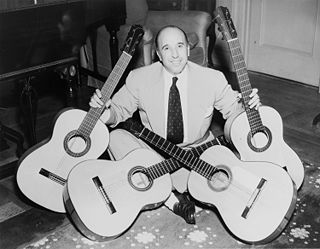
This is a list of notable events in music that took place in the year 1954.
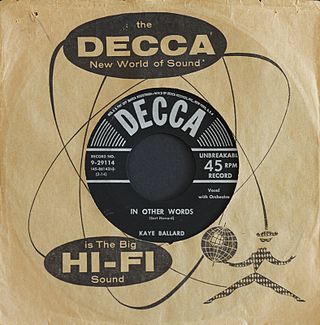
"Fly Me to the Moon", originally titled "In Other Words", is a song written in 1954 by Bart Howard. The first recording of the song was made in 1954 by Kaye Ballard. Frank Sinatra's 1964 version was closely associated with the Apollo missions to the Moon.
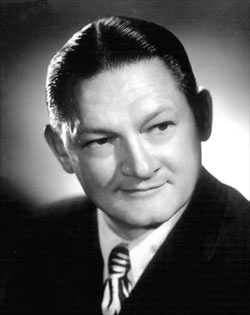
Albert Victor Young was an American composer, arranger, violinist and conductor.
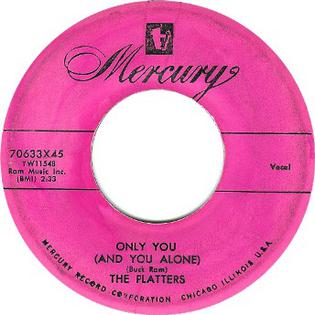
"Only You (And You Alone)" (often shortened to "Only You") is a pop song composed by Buck Ram. It was originally recorded by The Platters with lead vocals by Tony Williams in 1955.
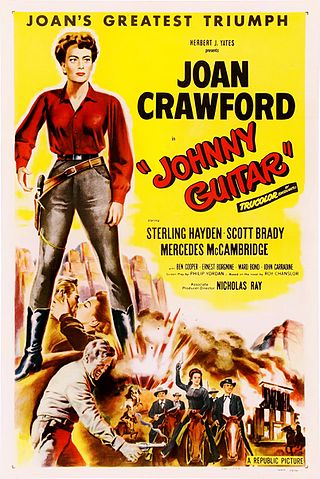
Johnny Guitar is a 1954 American Western film directed by Nicholas Ray and starring Joan Crawford, Sterling Hayden, Mercedes McCambridge, Ernest Borgnine and Scott Brady. It was produced and distributed by Republic Pictures. The screenplay was adapted from a novel of the same name by Roy Chanslor.
"Anema e core" is a popular song.
"Malagueña" is a song by Cuban composer Ernesto Lecuona. It was originally the sixth movement of Lecuona's Suite Andalucía (1933), to which he added lyrics in Spanish. The song has since become a popular, jazz, marching band, and drum and bugle corps standard and has been provided with lyrics in several languages. In general terms, malagueñas are flamenco dance styles from Málaga, in the southeast of Spain.
"Chapel of Love" is a song written by Jeff Barry, Ellie Greenwich and Phil Spector, and made famous by The Dixie Cups in 1964, spending three weeks at number one on the Billboard Hot 100. The song tells of the happiness and excitement the narrator feels on her wedding day, for she and her love are going to the "chapel of love", and "[they'll] never be lonely anymore." Many other artists have recorded the song.
"Granada" is a song written in 1932 by Mexican composer Agustín Lara. The song is about the Spanish city of Granada and has become a standard in music repertoire.

"Somebody Loves Me" is a popular song, with music written by George Gershwin, and lyrics by Ballard MacDonald and Buddy DeSylva. The song was published in 1924 and featured in George White's Scandals of 1924.
"Manhã de Carnaval", often referred to as "Black Orpheus", is a song by Brazilian composer Luiz Bonfá and lyricist Antônio Maria.

"Love Theme from The Godfather" is an instrumental theme from the 1972 film The Godfather, composed by Nino Rota. The piece was lyricized in English by Larry Kusik into "Speak Softly, Love", a popular song released in 1972. The highest-charting rendition of either version was by vocalist Andy Williams, who took "Speak Softly Love" to number 34 on Billboard magazine's Hot 100 and number seven on its Easy Listening chart.
"Is That All There Is?", a song written by American songwriting team Jerry Leiber and Mike Stoller during the 1960s, became a hit for American singer Peggy Lee and an award winner from her album of the same title in November 1969. The song was originally performed by Georgia Brown in May 1967 for a television special. It was first recorded by disc jockey Dan Daniel in March 1968, but this was an unauthorized recording that, while played on Daniel's own radio show, went unissued at the songwriters' request. The first authorized recording was by Leslie Uggams in August 1968. Then came the hit Peggy Lee version in August 1969, followed by Guy Lombardo in 1969 and Tony Bennett on 22 December 1969.
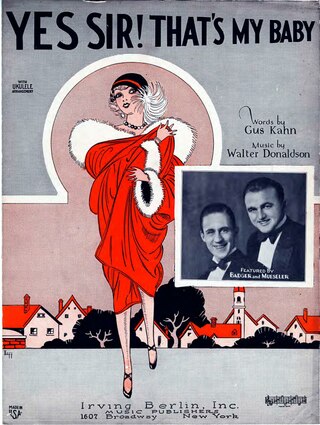
"Yes Sir, That's My Baby" is a popular U.S. song from 1925. The music was written by Walter Donaldson and the lyrics by Gus Kahn. It is now in the public domain.
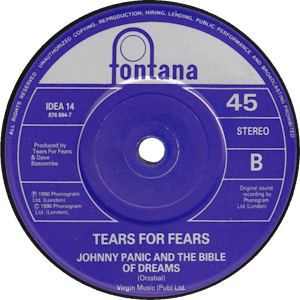
"Johnny Panic and the Bible of Dreams" is a song by the British band Tears for Fears, originally appearing as the B-side to their 1990 single "Advice for the Young at Heart" before being remixed by the techno producer/DJ band Fluke and released as a single in its own right in 1991. The remix was later included on the band's B-side compilation album Saturnine Martial & Lunatic.

"You Don't Miss Your Water" is a soul song and the debut single written and recorded by American singer William Bell. It was released by Stax Records in 1961. It is Bell's signature song and best known recording.
"Stella by Starlight" is a popular song by Victor Young that was drawn from thematic material composed for the main title and soundtrack of the 1944 Paramount Pictures film The Uninvited. Appearing in the film's underscore as well as in source music as an instrumental theme song without lyrics, it was turned over to Ned Washington, who wrote the lyrics for it in 1946.

Charles Fowler Singleton Jr., known as Charlie "Hoss" Singleton, was an American songwriter, best known for having co-written the lyrics for "Strangers in the Night" and "Moon Over Naples".
"I'll Close My Eyes", first published in 1945, is a song written and composed by the English songwriter and bandleader Billy Reid. This song is usually performed with altered lyrics by the American songwriter Buddy Kaye. The song has become a jazz standard.
"E penso a te" is a song composed in 1970 by Lucio Battisti based on the lyrics by Mogol. Initially sung by Bruno Lauzi, it was subsequently re-recorded by numerous other artists. The most popular version remains the one which its author gave in 1972.










